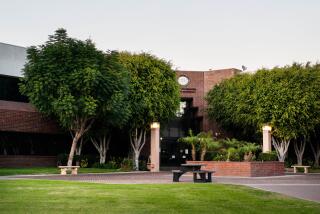Had Apparent Heart Attack in Zimbabwe : Dr. J. Alfred Cannon; Health Crusader
- Share via
Dr. J. Alfred Cannon, a psychiatrist who crusaded for better mental health facilities for minority communities and who was instrumental in establishing the Drew Medical School in South-Central Los Angeles, died of an apparent heart attack in Zimbabwe where he had lived since 1983, his family said Thursday. He was 59.
Details surrounding his death on Tuesday in Harare, the capital of the African nation, were sketchy, but his son in Los Angeles, J. Alfred Cannon Jr., said his father was stricken without warning and died shortly thereafter.
Friends said Cannon moved to Zimbabwe to help develop the health-care system after the former British colony, then known as Rhodesia, was restored to black rule in 1979. The move reflected his commitment to black activism for self betterment.
“He wanted to be part of the struggle of a new developing nation,” said psychologist Jackie Kimbrough, a friend of Cannon.
Cannon, who was an assistant professor of psychiatry at UCLA, was a persistent supporter of quality mental health care for inner-city neighborhoods in the aftermath of the 1965 Watts Riots.
In the years following the unrest, Cannon was instrumental in founding the Drew Medical School in 1966 (now part of the Martin Luther King Jr./Drew Medical Center); the Central City Community Mental Health Center and its successor, the Kedren Community Mental Health Center and the psychiatric department at King.
He also was the driving force in the 1960s behind the creation of the Frederick Douglass Child Development Center.
Explained Feelings
Cannon, in the months following the Watts Riots, tried to explain how blacks felt about many things, including “white flight.” In one speech, he said:
“When a white neighbor puts up a ‘for sale’ sign and you know you’re not so far apart financially and educationally, it’s very hard. You realize they’re not at all certain what they ought to do. Suddenly, they feel they have to leave because a black-faced person has moved in. Childhood myths overwhelm them. And these feelings are covered over by talk about the price of the home and other rationalizations.”
Several black leaders in Los Angeles praised Cannon upon hearing of his death in Africa.
A close friend, Rep. Mervyn M. Dymally (D-Los Angeles), said he was a man of vision who worked for better ties between Africa and African-Americans. “He left behind a number of institutions which were built to change the lives of the poor,” Dymally said.
“When he lived here, he touched many people with his contributions to our community,” Mayor Tom Bradley said. “He leaves a legacy of caring for those he sought to serve.”
Rep. Augustus F. Hawkins (D-Los Angeles) called Cannon “one of the brilliant minds in our community and a venerable warrior.”
Information about memorial services was not immediately available.
More to Read
Sign up for Essential California
The most important California stories and recommendations in your inbox every morning.
You may occasionally receive promotional content from the Los Angeles Times.













